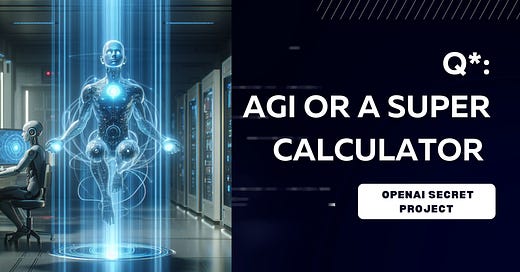Q* (Q Star): AGI or A Super Calculator
There's a lot of rumors and misconception of what is Q* supposed to be, which needs clarity and context of what is actually Q*.
Some of the main key points about Q*, OpenAI’s secret project, are:
Q* is a project that aims to achieve Artificial General Intelligence (AGI), which is the ability of machines to learn and reason at a human-like level.
Q* may be related to a technique called “process supervision”, which involves training an AI model to break down the steps needed to solve a problem.
Q* has reportedly been able to solve certain mathematical problems on the level of grade-school students, which is seen as a sign of human-like intelligence.
Q* may have played a role in the recent leadership turmoil at OpenAI, where the CEO Sam Altman was fired and then rehired after a board shakeup.
What is Q*?
Q* is a term that has been used to refer to a hypothetical artificial intelligence system that could achieve superintelligence, also known as artificial general intelligence (AGI). The term was coined by OpenAI, a research organization that aims to create and ensure the safe and beneficial use of AGI. However, Q* is not an official name or a specific project, but rather a placeholder for a possible future AI system that could surpass human intelligence and capabilities.
Misconceptions:
One of the misconceptions about Q* is that it is related to Q-learning, a model-free reinforcement learning algorithm that learns the value of an action in a particular state. Q-learning is one of the methods that OpenAI has used to train some of its AI systems, such as DQN, A3C, and DDPG. However, Q-learning is not sufficient to achieve AGI, as it has several limitations, such as the curse of dimensionality, the need for exploration, and the lack of generalization. Q* is not a variant or an extension of Q-learning, but a different concept altogether.
Another misconception about Q* is that it is already in development or close to completion. OpenAI has not announced or confirmed any details about Q* or its progress, and it is unclear if such a system is even feasible or desirable. The only source that mentioned Q* was a Reuters article from 2022, which cited anonymous sources who claimed that the maker of ChatGPT had made progress on Q* and that some internally believed it could be a breakthrough in the search for AGI. However, this article was not verified or endorsed by OpenAI, and it could be based on speculation or misinformation.
Therefore, Q* is a speculative and vague term that should not be confused with Q-learning or taken as a definitive indication of OpenAI’s goals or achievements. Q* is not a concrete or well-defined AI system, but a potential and hypothetical one that may or may not exist in the future.
Rumors:
Q* is a breakthrough that could threaten humanity. This is based on a report by Reuters, which claimed that some OpenAI researchers wrote a letter to the board, warning them of the potential dangers of Q*. However, this report has been disputed by other sources, such as The Verge, which said that the board never received such a letter and that Q* was not related to the firing and reinstatement of OpenAI CEO Sam Altman.
Q* is the beginning of artificial general intelligence (AGI). AGI is a hypothetical level of AI that can perform any intellectual task that a human can. Some people have speculated that Q* is a sign of progress towards AGI, as it demonstrates a new way of learning and reasoning. However, this is also unconfirmed and unsupported by evidence. According to The Information, Q* is still only capable of solving grade-school math problems, which is far from the complexity and versatility of human intelligence.
Q* is a secret and unique project by OpenAI. Some people have suggested that Q* is a mysterious and exclusive project that OpenAI is hiding from the public and its competitors. However, this is also unlikely, as OpenAI is known for its openness and collaboration with other researchers. Moreover, Q* may not be as novel as it seems, as other AI labs, such as Facebook AI Research and DeepMind, have been working on similar problems of improving the reliability and planning of large language models, according to Yann LeCun, the chief AI scientist at Meta.
(This is just a hypothetical explanation of how Q* works, based on some assumptions, guesses and using ChatGPT-4 to paraphrase. I do not have any direct access or knowledge of Q*.)
How does Q* work?
It is a codename for a project by OpenAI, it’s said to be a new model that can learn and perform mathematics, which is considered a challenging task for AI. However, there is a lot of uncertainty and speculation about Q*, as OpenAI has not officially confirmed or revealed anything about it.
Based on some leaked information and rumors, Q* may be using a novel approach to combine natural language processing (NLP) and symbolic reasoning. NLP is the branch of AI that deals with understanding and generating natural language, such as English or French. Symbolic reasoning is the branch of AI that deals with manipulating symbols and logic, such as algebra or geometry.
Q* may be able to learn and perform mathematics by translating natural language questions into symbolic expressions, and then using a large-scale neural network to solve them. For example, if you ask Q* “What is the area of a circle with radius 5?”, it may be able to convert this question into the formula.
A=πr2
, and then use its neural network to compute the answer
A=78.54
Conclusion
In summary, Q* is a project by OpenAI that involves a new model for learning and performing mathematics, but it is not a confirmed or revealed breakthrough that could threaten humanity, lead to AGI, or be a secret and unique project. It is mostly surrounded by hype and speculation, which may not reflect the reality of the project.






